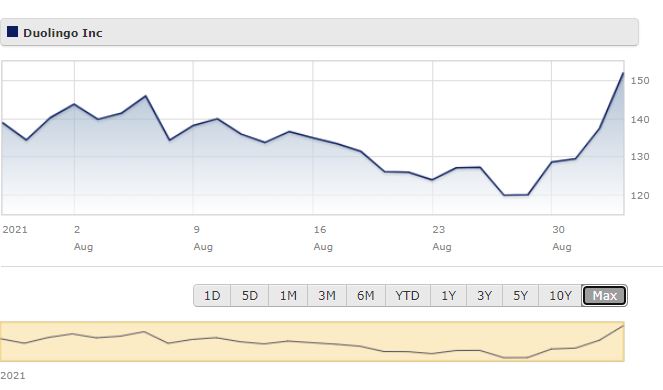
With many children going back to school this week, learning and education are very much on our minds at Morningstar.co.uk. We asked our Twitter followers to choose an appropriate stock and they’ve gone for language learning app Duolingo (DUO). The company is the newest to feature as our stock of the week, having only listed at the end of July this year. Like many US floats in recent years, Duolingo’s shares are up sharply from the offer price, with a 50% gain for investors who bought into the IPO.
As with music streaming service Spotify (SPOT), Duolingo operates a “freemium” model with free accounts supported by advertising and a paid-for subscription service known as Duolingo Plus, which costs users roughly $70 a year. The app motivates users to keep going using “nudge” psychology and gaming features to keep learners logging in every day to keep up their daily "streaks". While you can interact and compete with other users, it’s possible to learn a language without any human interaction at all, with the app relying heavily on machine learning and AI.
That remote learning model proved particularly popular during last year’s lockdown, with monthly active users rising from 27.3 million in 2019 to 36.7 million in 2020. The app has been downloaded more than 500 million times and is in the top 10 most downloaded education apps on the Apple App Store and Google Play. Language learners wishing to show their proficiency in English can also take the Duolingo English Test, which costs $49 and is widely accepted by employers.
Duolingo Share Price Since IPO
While the company has only been public for just over a month, it has just released second quarter results which gives investors insight into user trends. Many online services that saw a spike in activity during 2020 have seen a minor tailing off into this year, and Duolingo is no exception. Monthly active users dipped 3% to 37.9 million in Q2 2021 from 39.2 million in the same period of 2020. That’s perhaps not surprising as that period was the height of lockdowns across the world. Still, paid subscribers increased 46% over the year to 1.9 million. Revenues and gross profit were up around 50% over the year, but after tax the company made a very modest loss of $0.2 million.
No More Lecture Halls and Textbooks?
Duolingo’s aim is to use its first mover advantage and brand recognition to jump on the online learning bandwagon. Education has been one of the last parts of the "analogue" world to be disrupted, but now tchange has been forced upon teachers and students alike and is likely to be irreversible. Research firm HolonIQ estimates that the value of digital language learning is likely to increase sharply in the coming years - the industry, both online and offline, was worth $61 billion in 2019 and is forecast to top $100 billion by 2025, with digital learning making up half of that. Duolingo investors will be hoping the firm's "network effect" will keep users tied to the platform in the way that people remain loyal to Facebook. And as social media giants have expanded their services from their basic offering, so Duolingo is branching out beyond language learning into other areas like maths tuition.
Duolingo’s mission to “develop the best education in the world and make it universally available” sounds noble but Chinese regulators may take a different view. Duolingo and other language learning apps were removed from app stores in China in August, amid a wider crackdown on the education, tech and gaming industries. While Duolingo expects this ban to be temporary, not being able to access China’s estimated 500 million English language learners could be a serious threat to its plans. Meanwhile, like every successful app of recent years, Duolingo has attracted imitators, with competitors including India's BYJU, Babbel, Busuu and Memrise, the latter of which has raised more than $20 million in venture capital funding, according to Pitchbook, a Morningstar company. Pitchbook notes that Memrise’s most recent funding round in late 2020 brought in investments from VC specialist Octopus Ventures and the UK Government. So there are plenty of rivals lining up to knock the Duolingo owl off its perch.





























